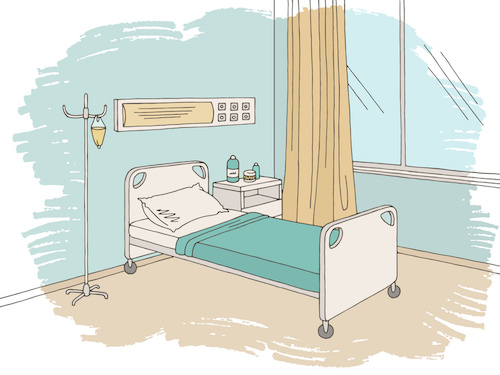
I have been hospitalized three times. I was given heavily sedating medication much of the time, however I will never forget what I went through. Each time, I was in crisis, at my life’s lowest points, looking for a path forward. Instead, I was treated like I was a threat to others safety, as if I had done something terribly wrong. Instead of receiving care, my experiences left me scarred, stalled and aimless for years afterwards.
I Needed Treatment, Not Sedation
My last psychiatric hospitalization was the most painful. I arrived, strapped into a wheelchair, to a chaotic psychiatric emergency room. They separated me from my husband to interview me. After my intake, they placed me on a gurney and forcibly medicated me.
I was left on that gurney in the corridor of a psychiatric ER for two days before an inpatient-psychiatric bed became available. I couldn’t sleep or rest. Another psych patient wailed constantly. I was in internal crisis, yet there was crisis all around me. The last thing I can remember from my experience in the ER was being forcibly medicated one more time.
Once admitted to the inpatient ward, I awoke to find myself in leather restraints. There was no one there to explain where I was or why I was being detained or subdued. I didn’t know what was happening. I was alone.
As I slowly gained awareness of myself and my surroundings, it became clear that we were under constant watch. The staff was concerned that we were potentially dangerous to ourselves and others. Everything in the psych ward was violence and suicide proof. Even the personal belongings our loved ones brought were carefully checked. I had never been violent or suicidal before in my life. I started thinking: “Am I really this ill?” “Am I really violent and suicidal?” The severity of my illness and all that it meant, the stigma, started to sink in.
I Needed Help, Not Imprisonment
Treatment seemed to focus on immediate stabilization, rather than long-term health. I saw my assigned doctor infrequently, and more often I saw a resident. I couldn’t see my outside doctor. I was placed on a new medication regimen. I was highly sedated for most of my stay. Many patients never left their room, and others spent the day walking loops around the ward. I never once saw a nurse in my room.
They kept us on a locked down ward. I was never allowed to go outside, not even with an escort. Security guards roamed the floors. I also faced other restrictions, including suspension of computer and phone privileges, in-room confinement and solitary confinement to a seclusion room.
At one point, my condition significantly deteriorated, and I fell into a severe manic state. Two security guards picked me up and dragged me to a seclusion room furnished with only a thin red mattress on the floor. They wrapped my arm tightly around my back, pinned me to the floor, and then forcibly medicated me. They left me in a locked room for hours as a guard watched me through a small wire-glass window. When they released me, they placed me on around-the-clock surveillance for a week. They watched me even as I slept.
I Needed Support, Not Isolation
I desperately needed love, comfort and support from my family during my stay, but it was difficult to stay connected with them by phone or in person. Therewere no phones in the rooms. There were only a couple of payphones located in the hallway. As a policy, staff did not answer calls, only patients could answer. Often when a patient answered a call from my mother, they would tell her that they didn’t know me, I was not there or they couldn’t find me. There was no way to leave a message. Each time this happened, my mother worried that something might be wrong. She was often unable to reach me for days.
No visits were allowed in patient rooms, out of a fear that we might injure our loved ones. All visits had to occur in full view of clinicians, security and other patients and their visitors. It was more than a bit uncomfortable for my spouse and I to express our heartfelt emotions at this sensitive time in public view. Even a hug felt awkward when the person next to you had no visitors, which is often the case in the psych ward. These should be among the most private moments families have together, when a loved one is at their worst lows.
Visiting hours were three hours shorter per day for the psych ward than “regular” patients. Did we need less love, compassion and human contact? Were we somehow less worthy or important than “regular” patients?
This Needs to Change
I returned home after each one of my hospitalizations severely depressed. I was too demoralized to appreciate that I was discriminated against. At times, I was made to feel like a criminal being punished, a danger to society. I felt it was all my fault for getting sick in the first place. I felt that I deserved the treatment that I received. I was at a top hospital. This perception fed off the social stigma I already experienced and certainly did not help my recovery.
These inpatient experiences traumatize me to this day. We need to focus on how it can be better, to turn psychiatric hospitalization into a constructive turning point towards recovery. The only positive memory I have was of an occupational therapist from my last hospitalization. She treated patients with genuine care and affection. She designed programs not only to occupy us, but to inspire us to get better. She emphasized the power of peer support. She showed me my first example of a high functioning person with mental illness. She planted a seed that my fellow patients and I, struggling as we were, could get better.
I like to imagine a psych ward staffed with empathetic professionals like that therapist, and how much better the experience could be. She helped me get to where I am today, because she cared and shared tools to help me. It felt like this is what a recovery-oriented psych ward should be like all the time. A place that helps sick people recover, as a hospital should. A place that doesn’t treat you like a violent criminal because you have mental illness. A place that shows compassion for how hard it is to go through a mental health crisis. A place that gives you treatment, care and support rather than sedation, isolation and discrimination.
Author’s note: I appreciate this opportunity to share my experiences and thank Laura Greenstein of NAMI very much for making this possible and thank you to my wonderful occupational therapist.
Katherine Ponte is a mental health advocate, writer and entrepreneur. She is the founder of ForLikeMinds, the first online peer-based support community dedicated to people living with or supporting someone with mental illness, and Bipolar Thriving, a recovery coaching service for caregivers and their loved ones affected by bipolar disorder. She is also the creator of the Psych Ward Greeting Cards program in which she personally shares her recovery experiences and distributes donated greeting cards to patients in psychiatric units. She is in recovery from severe bipolar I disorder with psychosis. She is also on the board of NAMI New York City.
We’re always accepting submissions to the NAMI Blog! We feature the latest research, stories of recovery, ways to end stigma and strategies for living well with mental illness. Most importantly: We feature your voices.
Check out our Submission Guidelines for more information.


